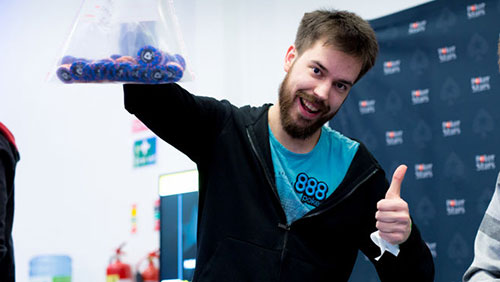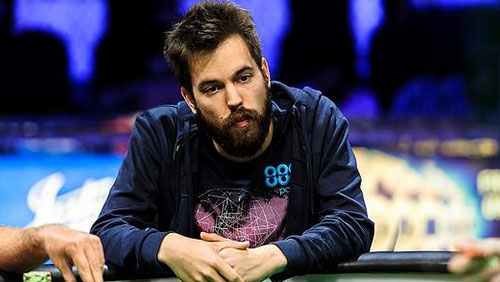Lee Davy sits down with the three-time World Series of Poker bracelet winner, and World Poker Tour Champions Club member, Dominik Nitsche, to learn more about his poker routines.
At only 26-years of age, Dominik Nitsche has earned over $6.7m in live tournaments, including three World Series of Poker (WSOP) bracelets, and a World Poker Tour (WPT) title; online tournaments have also netted him over $4.1m.
How does he do it?
Let’s find out.
Who are you?
“I’m Dominik Nitsche, originally from Minden, Germany now living in Edinburgh. I’m 26 years old and have been playing poker for about ten years.”
What is your claim to fame?
“I play a lot of poker tournaments (live as well as online), and I got lucky enough to walk a w ay with a few major titles. I’m also an ambassador for 888 and represent the site at all major tournaments. I’m also known for firing a lot of bullets in High Roller tournaments.”
ay with a few major titles. I’m also an ambassador for 888 and represent the site at all major tournaments. I’m also known for firing a lot of bullets in High Roller tournaments.”
When did you have aspirations to be a poker player?
“I never planned on becoming a professional poker player. I started in High School, and when I finished my final exams, I already had a pretty big bankroll thanks to my success at online tournaments and my win on the LAPT. I decided to forget about Uni for a few years to see how poker went. And here we are eight years later.”
What do you do in the first hour upon waking up?
“I lie in bed checking up on whatever happened while I was sleep. Then I have breakfast and see what cash games are running. I’ll play for a bit or decide to study depending on the games.”
What time of the day do you find it easier to play poker and why?
“Whenever, that’s the beauty of playing poker for a living. It depends on how I feel. I love being able to play whenever I want.”
Do you have defined goals for how many hands/sessions you play in a week: both live and online?
“As I said above, I don’t plan for how much I play. I typically try to play every Sunday and Tuesday, but that’s about it. I still play most of the days even if I don’t specifically plan for it. Sometimes I play for an hour and other times 12 hours. It depends on what kind of action I’m getting.”
Where do you play and at what stakes?
“Online I play all high stakes tournaments as well as $25/$50 on 888. When I play live, I play whatever the highest tournament is that’s running at that moment. Anything from $1k to $300k buy in. Occasionally I play cash when I’m in Vegas as I can’t play online poker.”
Do you have a particular routine that you go through before you begin an online poker session?
“No, but I try to eat something before I play if I can’t order any decent meal to the table. Also, I need my morning coffee.”
When you first sit down to play poker how do you begin?
“Well, that’s easy. I sit down, and I try to play my best poker. Same as all the other hands I play.”
Describe your grinding station set up.
“I have a height adjustable standing desk, two pretty big monitors and a computer in my office. My chair is the Hermann Miller embody.”
What tools do you use when playing poker, live and online?
“I don’t use anything when I play online other than PT4.
When I play high stakes cash games, I occasionally use a randomiser to help me decide when to bluff or bluff catch. I also have a randomiser app on my phone :)”
What’re your thoughts on listening to music when playing? If you do, what do you listen to?
“It’s not for me.”
If you use a HUD then how do you use it?
“I use it, and pay close attention to the most frequently used statistics. I don’t pay as much attention to something like Cbet river frequencies over small samples.”
What system do you use for taking notes on your opponent’s, live and online?
“When I’m playing live I trust my memory and my poker friends for reads on players. It’s the same, online, but I have the notes written down in the client.”
Do you have a particular warm down routine after you have finished a session?
“Nope.”
What do you eat and drink when you play, both live and online?
“Coffee tea or water. Sometimes cold brew coffee at home. I don’t eat much while I play but I usually try to avoid unhealthy foods.”
What is your process of review?
“Everyone knows there are solvers out there these days. They are better than any human can be. I try to learn a lot from software like this as I find most of my opponents tend to try and copy a solver style.”
How do you improve your mental state?
“I don’t improve my mental state. I sit down and play poker, and try to do it as well as I can. I do all my homework away from the tables, so I usually know what play is right in the situation within seconds. I find the mental game incredibly overrated, and it shows that people don’t understand how poker works.”
How much of your time is spent playing versus learning?
“70/30 learning wins. At this point in my career, I tend to focus on High Rollers mainly, and I, therefore, think it’s better for me to keep improving as much and as quickly as possible. I will play quite a bit of cash at home just to battle against the best online, but I do consider it part of studying. You also need to get hands in and test out your strategies.”
How do you know when to stop a session?
“I don’t. My approach is to end a session when I’m either too tired, or the game simply isn’t good anymore. Sometimes, if you’re playing a really big fish you can’t leave.”
Are you consciously trying to emulate the style of a particular player? Do you have people you look to as models for your game?
“Liberatus? Surely, that’s the goal? But there are a few human players I look up to like Fedor {Holz} and Steffen {Sontheimer}. They are fantastic players, and I can always count on them to provide me with feedback on all of my absurd overbet bluffs.”
Is poker easy? Does it come naturally to you?
“Interesting question: I would say, “yes” but only now that I started working with solvers. When I first started playing, poker was very easy to beat with what was just a simple strategy. Nowadays people use computer programs to analyse every single move.
“I find that emulating the thought process of a computer comes incredibly easy to me. I’ve run so many simulations that whenever I see a situation, I come very close even before looking it up.”
What is your favourite moment in poker?
“Most recently, it was when Steffen Sontheimer asked me to pay out Andrew Chen who collected a bounty for busting me. Another favourite is slow rolling the guy who is known as “the screaming Russian” when I had a straight flush against his nut flush. He slammed his nut flush on the table and started screaming in his usual celebration. I quietly informed the dealer and the other players that his hand was no good and waited for him to come back to the table. He didn’t see the straight flush at first but laughed it off afterwards.”
 What books/courses/mentors have helped improve your game (doesn’t have to be a poker book)?
What books/courses/mentors have helped improve your game (doesn’t have to be a poker book)?
“Poker solvers, not even close. Also the German crew.”
Do your surroundings affect your work, how?
“Yeah, I like to play poker in a quiet and relaxed environment. I need to be able to think very hard occasionally. Now, the key word here is ‘occasionally’. 99% of my decisions are relatively trivial and automatic, but sometimes it’s not that easy, and I can’t be distracted when that happens.”
Was there ever a time when you didn’t want to play poker? How did you get out of the funk?
“Nope.”
How does poker make you feel?
“It’s fun. I enjoy the game, and I love competing as well as winning trophies and bracelets. I’ve been playing the game for almost ten years, and there is still so much to learn.”
What is the one thing you know you have to change after answering these questions?
“I’ve got nothing sorry. It might sound super arrogant, but I honestly believe I couldn’t be in a better way in my poker career. I’m playing better than ever.”
What is the one question I didn’t ask but should have asked, and now answer it?
“Q: How do you get good at poker? A: Download a solver.
Learn how to use it. Ask the program clear questions and apply the answers. Keep repeating. Done! Q: What is the worst way to study? Asking your friends/coaches the same questions you’d ask a solver and expecting comparable results. Unless they have done the work with the newest programs themselves, I’d always take their advice with a big grain of salt.”